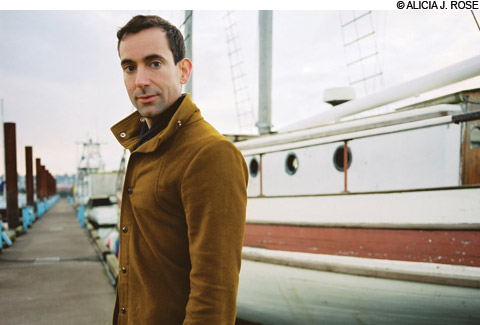
“There’s a description of Arabic calligraphy as ‘music for the eyes,’ ” says Thompson, “and that’s how I
felt about it from when I first saw it. The musicality of it, the movement, the flow.” |
First of all, let's get it out of the way: Craig Thompson's new graphic novel, Habibi, is a masterpiece.This isn't an opinion. This book is a gorgeous object; to make it, Thompson apparently covered himself in honey and rolled around in a thousand years of Arabic calligraphy and Islamic art, and the result is breathtaking — the amount of ink expended on one resplendent panel after another, not to mention the virtuoso draftsmanship, speaks of hundreds of hours of hard work. Like the Taj Mahal or the Alhambra in Spain, the first thing you think when you see it is to marvel that someone made all this.
Okay, got it? Good. Let's put that aside.
Eight years ago, Thompson gobsmacked the comics world with his first major work, Blankets. At some 592 lavishly illustrated pages, Blankets was perhaps the longest work of graphic literature ever published, and it was hailed as one of those comics that could redeem comics — a medium-redefining work like Maus or Watchmen.
I didn't like Blankets. I wanted to. I recognized its craftmanship. But the story seemed to end in midbreath, unresolved. A memoir, it tells the story of Thompson's circumscribed upbringing in rural, Christian Wisconsin. In that world, sexual desire is fraught with sin, but so is creativity and the life of the mind. The only book Thompson's parents need is the Bible. When young Craig talks about his love of drawing in Sunday school, a teacher tells him that it's a sin to attempt to improve on God's creation. As Craig struggles in this cultural straitjacket, he falls in love with a girl, has some very chaste sex, and loses her — and then the book ends. Craig has lost his faith, but nothing has replaced it — only a blank expanse of Wisconsin snow.
Habibi — even more massive, at 675 pages — is in many ways the opposite of Blankets. Blankets was autobio; Habibi is fiction. Blankets is set in 1980s Christian America; Habibi is set in a fairy-tale Islamic dystopia — half Blade Runner, half Arabian Nights.
Even so, the two books are two chapters in a single story. Habibi is a necessary sequel to Blankets — the inevitable development of the themes of the first book.
Looking back now, I think that, in Blankets, Thompson was fighting even to begin to articulate the great question of his childhood: whether it's acceptable to make art, and to make love, in the presence of an all-powerful but unknowable God. It took everything he had just to ask that question.
It is only in Habibi that Thompson finds an answer.
The sexual and the artistic are conflated early in Habibi. The book opens with a child weeping; this is Dodola, who has been sold into marriage. Dodola's husband has just deflowered her, and he tells her she has no reason to cry. "Tonight is cold," he says, and wraps her in a sheet — or is it a blanket? — that is marked with her hymenal blood. A dark mark on a white background, like ink on paper.